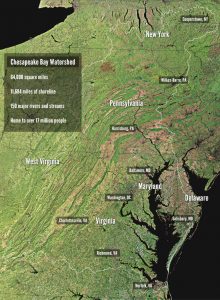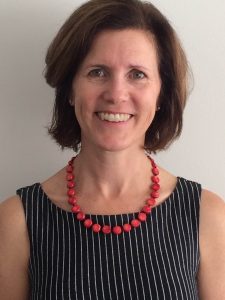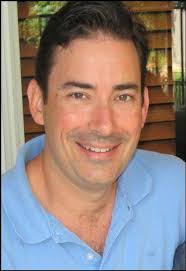
Kelly Shenk, Agricultural Advisor, U.S. Environmental Protection Agency, Region III
Gary Shenk, Hydrologist, USGS at the Chesapeake Bay Program Office
People, food and water have an inherently inseparable relationship. Clean water depends on healthy viable farms, and profitable farms depend on clean water. So why is it that farmers and environmentalists often are pitted against one another? Farmers say they are stewards of the land and care deeply about soil quality and water quality – in fact their livelihood depends on it. But, agricultural nonpoint source pollution is one of the major sources of impairment to the nation’s rivers and streams. Can we really have thriving agriculture and clean streams? If so, how do we get there? Kelly Shenk provides “food for thought” on the role of agricultural stakeholder engagement in the Chesapeake Bay restoration.
The structure for estimating the effect of agriculture on water quality in the Chesapeake Bay is provided by the Total Maximum Daily Load (TMDL) that the USEPA established in 2010 which sets the maximum allowable watershed nutrient and sediment loads necessary for estuarine water quality standards. Working through the multi-state partnership of the Chesapeake Bay Program (CBP), a new watershed model to predict watershed loads is being developed to serve as the primary TMDL accounting tool. Participatory modeling is a distinctive element of the approach involving collaborative efforts of hundreds of stakeholders working through the CBP. Decisions on model inputs, simulation routines, and management are cogenerated by scientists, managers, and other stakeholders. This open and inclusive process tends to increase the acceptance of the final model and accounting results by stakeholders. Gary Shenk will walk through the command lines of this solutions-driven community operating system that provides the modern interface between science and society in the Chesapeake Bay watershed.
 Kelly Shenk has been working on collaborative stakeholder engagement for over twenty years with the USEPA. Currently she serves as the Agricultural Advisor for the Mid-Atlantic region of EPA, advancing cooperative ways to work with the agricultural industry to achieve both sustainable agriculture and clean water. Before coming to the EPA, she worked on agricultural and urban phosphorus pollution issues in the Lake Champlain Basin and the Lake Geneva watershed in France. Her academic background includes an undergraduate degree in zoology from Duke University and graduate degree in natural resource planning from the University of Vermont.
Kelly Shenk has been working on collaborative stakeholder engagement for over twenty years with the USEPA. Currently she serves as the Agricultural Advisor for the Mid-Atlantic region of EPA, advancing cooperative ways to work with the agricultural industry to achieve both sustainable agriculture and clean water. Before coming to the EPA, she worked on agricultural and urban phosphorus pollution issues in the Lake Champlain Basin and the Lake Geneva watershed in France. Her academic background includes an undergraduate degree in zoology from Duke University and graduate degree in natural resource planning from the University of Vermont.
 Gary Shenk is a hydrologist with the USGS at the EPA’s Chesapeake Bay Program Office where he leads a multi-disciplinary team responsible for the development and operations for the CBP’s partnership watershed modeling effort. For the past two decades he has participated in substantial growth in the complexity of one of the most sophisticated watershed models in the country in response to the increasing specificity of management questions. He currently focuses on forging collaborations between federal, state, academic, and non-governmental organizations through the participatory modeling effort. He holds undergraduate and graduate degrees in economics and civil engineering from the University of Virginia.
Gary Shenk is a hydrologist with the USGS at the EPA’s Chesapeake Bay Program Office where he leads a multi-disciplinary team responsible for the development and operations for the CBP’s partnership watershed modeling effort. For the past two decades he has participated in substantial growth in the complexity of one of the most sophisticated watershed models in the country in response to the increasing specificity of management questions. He currently focuses on forging collaborations between federal, state, academic, and non-governmental organizations through the participatory modeling effort. He holds undergraduate and graduate degrees in economics and civil engineering from the University of Virginia.

